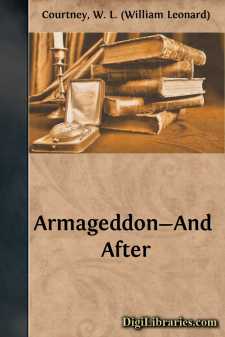Categories
- Antiques & Collectibles 13
- Architecture 36
- Art 48
- Bibles 22
- Biography & Autobiography 813
- Body, Mind & Spirit 142
- Business & Economics 28
- Children's Books 13
- Children's Fiction 10
- Computers 4
- Cooking 94
- Crafts & Hobbies 4
- Drama 346
- Education 46
- Family & Relationships 57
- Fiction 11828
- Games 19
- Gardening 17
- Health & Fitness 34
- History 1377
- House & Home 1
- Humor 147
- Juvenile Fiction 1873
- Juvenile Nonfiction 202
- Language Arts & Disciplines 88
- Law 16
- Literary Collections 686
- Literary Criticism 179
- Mathematics 13
- Medical 41
- Music 40
- Nature 179
- Non-Classifiable 1768
- Performing Arts 7
- Periodicals 1453
- Philosophy 64
- Photography 2
- Poetry 896
- Political Science 203
- Psychology 42
- Reference 154
- Religion 513
- Science 126
- Self-Help 84
- Social Science 81
- Sports & Recreation 34
- Study Aids 3
- Technology & Engineering 59
- Transportation 23
- Travel 463
- True Crime 29
Armageddon-And After
Description:
Excerpt
CHAPTER I
PROBLEMS OF THE FUTURE
The newspapers have lately been making large quotations from the poems of Mr. Rudyard Kipling. They might, if they had been so minded, have laid under similar contribution the Revelation of St. John the Divine. There, too, with all the imagery usual in Apocalyptic literature, is to be found a description of vague and confused fighting, when most of the Kings of the earth come together to fight a last and desperate battle. The Seven Angels go forth, each armed with a vial, the first poisoning the earth, the second the sea, the third the rivers and fountains of waters, the fourth the sun. Then out of the mouth of the dragon, of the beast, and of the Antichrist come the lying spirits which persuade the Kings of the earth to gather all the people for that great day of God Almighty "into a place called in the Hebrew tongue Armageddon." Translated into our language the account might very well serve for the modern assemblage of troops in which nearly all the kingdoms of the earth have to play their part, with few, and not very important, exceptions. It is almost absurd to speak of the events of the past three months as though they were merely incidents in a great and important campaign. There is nothing in history like them so far as we are aware. In the clash of the two great European organisations—the Triple Alliance and the Triple Entente—we have all those wild features of universal chaos which the writer of the Apocalypse saw with prophetic eye as ushering in the great day of the Lord, and paving the way for a New Heaven and a New Earth.
A Colossal Upheaval
It is a colossal upheaval. But what sort of New Heaven and New Earth is it likely to usher in? This is a question which it is hardly too early to discuss, for it makes a vast difference, to us English in especial, if, fighting for what we deem to be a just cause, we can look forward to an issue in the long run beneficial to ourselves and the world. We know the character of the desperate conflict which has yet to be accomplished before our eyes. Everything points to a long stern war, which cannot be completed in a single campaign. Every one knows that Lord Kitchener is supposed to have prophesied a war of three years, and we can hardly ignore the opinion of so good a judge. If we ask why, the obvious answer is that every nation engaged is not fighting for mere victory in battle, nor yet for extension of territory; but for something more important than these. They fight for the triumph of their respective ideas, and it will make the greatest difference to Europe and the world which of the ideas is eventually conqueror. Supposing the German invasion of France ends in failure; that, clearly, will not finish the war. Supposing even that Berlin is taken by the Russians, we cannot affirm that so great an event will necessarily complete the campaign. The whole of Germany will have to be invaded and subdued, and that is a process which will take a very long time even under the most favourable auspices. Or take the opposite hypothesis. Let us suppose that the Germans capture Paris, and manage by forced marches to defend their country against the Muscovite incursion. Even so, nothing is accomplished of a lasting character. France will go on fighting as she did after 1870, and we shall be found at her side. Or, assuming the worst hypothesis of all, that France lies prostrate under the heel of her German conqueror, does any one suppose that Great Britain will desist from fighting? We know perfectly well that, with the aid of our Fleet, we shall still be in a position to defy the German invader and make use of our enormous reserves to wear out even Teutonic obstinacy. The great sign and seal of this battle to the death is the recent covenant entered into by the three members of the Triple Entente. They have declared in the most formal fashion, over the signatures of their three representatives, Sir Edward Grey, M....


